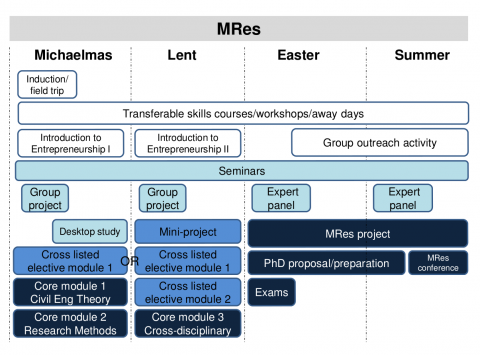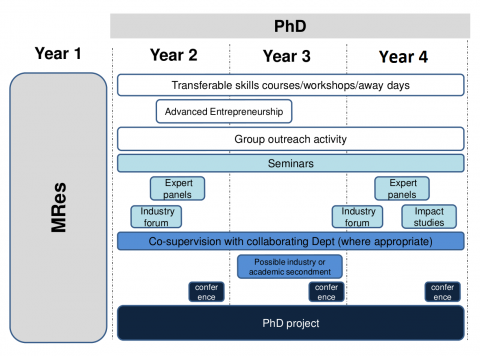The CDT MRes+PhD is a 1+3 model with a one year Masters course with taught and research elements followed by a three year PhD programme. The first year broad cohort-based MRes education will cover core Civil Engineering topics, related disciplines, and research and commercial skills training.

The programme starts with an induction programme and a field trip to visit a mix of construction sites and other sites of engineering and/or historical importance. Students will study 3 bespoke core taught modules specifically designed to cover Civil Engineering theory, Civil Engineering research methods and multidiscipliarity in Civil Engineering. A further 2 elective taught modules can selected from a list of subjects offered by Engineering and related departments in the University of Cambridge thereby providing a greater awareness of the wider context in which Civil Engineering operates.
Students will complete an individual desktop study and a mini-project which are likely to have a strong Industry link. A group project using large-scale Civil Engineering case studies, e.g. Crossrail, High Speed 2, Severn Tidal Power project as well as local projects e.g. North West Cambridge Development will take place over two terms.
An Introduction to Entrepreneurship course run by the Judge Business School which covers aspects such as innovation, ethics, entrepreneurship, finance, organisational behaviour and technology strategy and impact studies, is also compulsory.
Students will develop their transferable, professional practice and commercial skills through participation in relevant training sessions. A substantial MRes project will be undertaken under the guidance of a CDT Civil Engineering Supervisor. Students can select from a list of projects many of which will be co-created with Industry and will cover the Future Infrastructure and Built Environment CDT research themes. Students will submit a MRes thesis and present their work at a student-run MRes conference.
The subsequent 3 year specialist PhD training programme will embrace topics ranging from future energy infrastructure to sustainable urbanisation and innovative construction materials.

Core civil engineering research forms the major part of the three year PhD study. PhD students will be expected to publish high-quality journal papers and present their work at international conferences.
CDT students will spend around 80-90% of their time on their core research. The remaining 10-20% of their time will be devoted to bespoke activities, which will include a mix of impact studies; possible secondment to an industrial or international academic partner; additional multi-disciplinary components e.g. with a co-supervisor from another Department/division; and advanced professional, personal and commercial skills development.
Annual student-run conferences will showcase PhD research, provide networking opportunities and develop communication skills.

